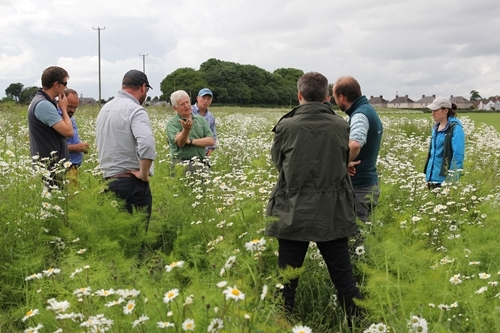 The PepsiCo FAB (Farming Arable Biodiversity) project aims to demonstrate how productive agriculture does not need to suffer for good environmental stewardship. The project uses what was learned during the EU Interreg PARTRIDGE project (2016-2023) and is aiming to scale up its approach. To demonstrate the various management strategies and practicalities, Balgonie Estate in Fife hosts several events throughout the year and acts as the project demonstration site, with the project also helping other pilot farms to prepare for the next round of agri-environment schemes arriving over the next few years.
The PepsiCo FAB (Farming Arable Biodiversity) project aims to demonstrate how productive agriculture does not need to suffer for good environmental stewardship. The project uses what was learned during the EU Interreg PARTRIDGE project (2016-2023) and is aiming to scale up its approach. To demonstrate the various management strategies and practicalities, Balgonie Estate in Fife hosts several events throughout the year and acts as the project demonstration site, with the project also helping other pilot farms to prepare for the next round of agri-environment schemes arriving over the next few years.
The farms taking part are:
- Balgonie Estate, Glenrothes, Fife (demonstration site)
- Balnamoon, Angus
- Bonerbo, Fife
- Easter Rhynd, Perth
- Gilston, Fife
- Leckerstone, Fife
The project is co-funded by the PepsiCo PAO (Positive Agricultural Output) fund and will run until 2025. The funding secured not only means that we can work with additional farms, but also secures the habitat that has been developed at Balgonie over the last decade, where people can see what has been achieved and discuss how we can scale up this approach across Scotland.
The project aims to demonstrate how arable farming can support the environment by implementing measures to improve the quality of available semi-natural habitats to benefit biodiversity, and by adjusting agricultural practices to increase cost-effective, nature-friendly productivity.

The project will take a producer farm cluster approach and assess how this approach can be used to scale up biodiversity benefits to a national level.
Through working closely with NatureScot and other stakeholders, the project aims to feed into various agricultural policy measures in Scotland (especially new agri-environmental schemes), future Scottish Government tools (e.g. scorecards and online apps), integrated pest management (IPM) and provide evidence of successful implementation of outcomes-based policy at a landscape scale.